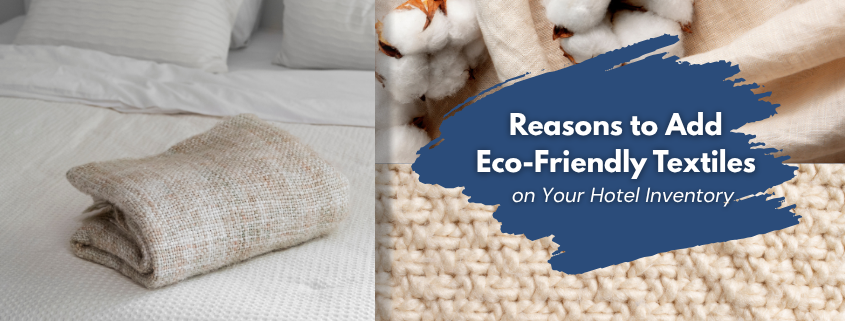Reasons to Add Eco-Friendly Textiles to Your Hotel Inventory
One of the many reasons hotels are shifting to sustainable choices is the increase in consumer preference for eco-friendly textile products. As a hotelier, it is important to adhere to new environmental conservation standards not only to meet customer satisfaction, but also to promote a greener brand image and proactively reduce carbon footprint. Textiles are essential to the hospitality industry, and fortunately, many types of sustainable textiles feature a sophisticated appearance, hygienic properties, and soothing textures.
The use of eco-friendly textiles brings a variety of benefits for hotel owners and guests. Discover the diverse types of sustainable textiles and how they can enhance the guest experience.
Types of Sustainable Textiles
- Organic Cotton
Where conventional cotton is cultivated using large amounts of water and chemicals, organic cotton is used in many types of hotel amenities, such as beddings, mattress toppers, and pillows. Its absorbent properties and delightful texture make it ideal for bathrobes and bath towels.
- Hemp
Hemp is a versatile material that only requires little water to reproduce. It also does not require any pesticides. Hemp is known for its antibacterial and hypoallergenic properties. Its unique slightly coarse but cotton-like texture makes it an attractive choice for beddings.
- Bamboo
Virgin bamboo is fast-growing, which means it is easy to cultivate and access. Bamboo fibers are breathable and possess antibacterial properties that make them resistant to mildew. This makes it friendly for hotel guests with sensitive skin. Hotel bath towels and beddings are some of the fabrics that can be produced with bamboo fiber.
- Flax
Linen is made from flax fibers, which are known for being twice as durable as cotton. Nearly the entire flax plant can be used to produce linen and other organic products, which effectively promotes waste reduction and maximizes the raw material. It is highly recyclable and biodegradable. It is also a very popular choice for breathable hotel linens, bed sheets, pillow casings, and bathroom towels.
- Recycled polyester (rPET)
Some eco-friendly textiles give life to old resources, like recycled plastic and various other consumer waste. Plastic bottles and nylon are used to create synthetic fibers like polyester. Textile manufacturers recycle polyester material using 59% less energy than virgin polyester, cutting their carbon footprint in half.
6 Benefits of Investing in High-Quality Sustainable Textiles for Your Hotel
- Durable and long-lasting
Despite its higher purchasing costs, organically-sourced hotel textiles can save you so much more in the long run. Sustainable textiles are less prone to damage and wear, compared to synthetic fiber, which easily break down after much use in a shorter period. Eco-friendly fabrics require less energy and chemicals to produce, which increases value for your hotel towels and linen.
- High-grade and ethically sourced
Organic materials typically adhere to both global sustainability standards and fair labor practices. Hotels can promote fabric producers that uphold excellent working conditions in their farms and factories. This also supports a transparent corporate social responsibility for both hoteliers and textile manufacturers.
- Naturally appealing texture
Plant-based fibers such as bamboo, linen, and hemp often feature unique, naturally-occurring texture due to the lack of rigorous processing and treatment. This also reduces the need for meticulous conditioning or ironing. Not only is this part of its organic characteristics, but its textures can amplify its decorative appeal for hotel furnishings. It exudes both a cozy and sophisticated feel that will leave a good impression on your guests.
- Health and hygiene
Eco-friendly textiles possess natural antibacterial properties, which reduce odor and keep it fresh. Plant-based fibers are also hypoallergenic, minimizing irritations and allergic reactions in guests with sensitive skin. Linen is a top choice for hoteliers due to its breathability, especially in humid weather, because it keeps guests cool throughout the night.
- Reduced environmental impact
The use of sustainable textiles lowers the need to spread potentially harmful pollutants that come from the production, maintenance, and disposal of synthetic fibers. Water conservation is also a huge benefit for hoteliers. Proper care and maintenance give sustainable linens a longer life, which results in less water consumption and frequency of replacement.
- Positive brand image
Eco-friendly hotels are not just a trend, but a branding and lifestyle that caters to the demands of eco-conscious consumers. Try investing in locally-produced sustainable textiles to support the local community. Using green hotel amenities promotes a healthier environment and allows business owners to adhere to global sustainability standards.
The different types of sustainable textiles introduce numerous benefits and health features that can better refine hotel linens, upholstery, and other fabrics. By choosing the right materials, you can elevate the comfort and elegance of your amenities while encouraging green practices.
ALSO READ: Initiatives for Sustainable Linen Management in Hotels
Still struggling to find a reliable supplier of hotel linens in the Philippines? Hotel and Spa Essentials is your go-to for eco-friendly textile products, luxury hotel amenities, and more. Send us a message to let us know how we can help you.





Leave a Reply
Want to join the discussion?Feel free to contribute!